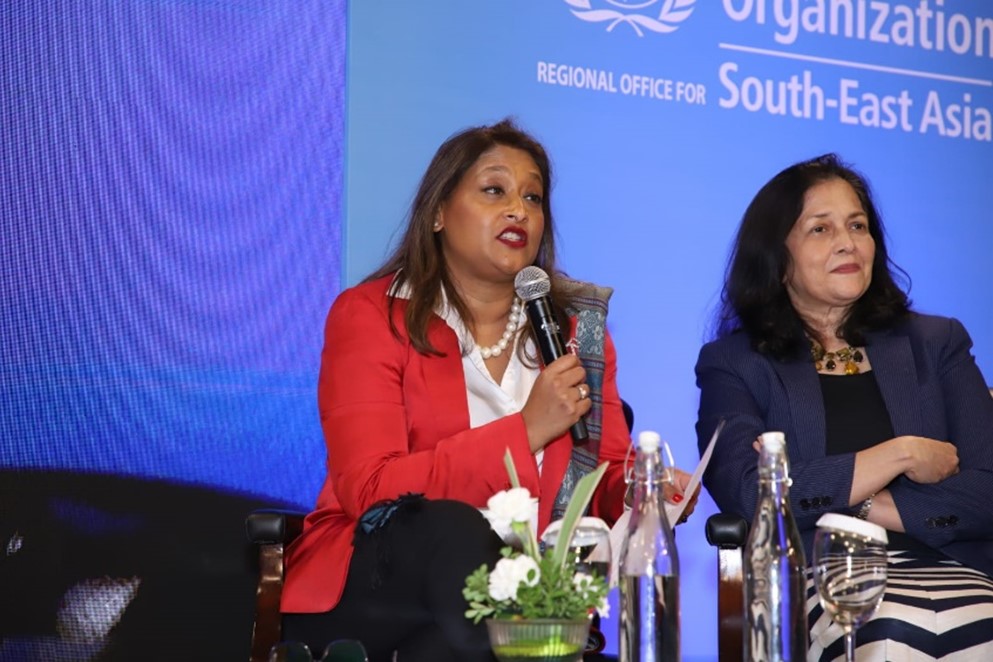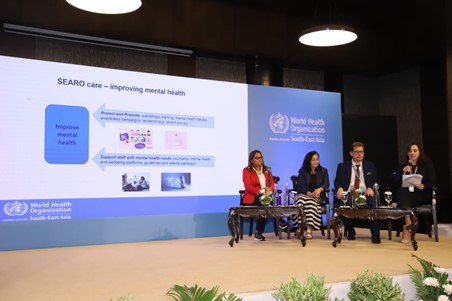On the last day of the 77th Regional Committee meeting, a side event on the SEARO Care initiative was held. The speakers were Regional Director Saima Wazed, Chef De Cabinet Dr Nazneen Anwar, Coordinator for Special Programmes at the Regional Director’s Office, Claire Munoz, and Ombudsman Balint Balassa. At the side event, Regional Director and Chef De Cabinet highlighted the importance of mental health, building a culture of empathy and supportiveness, and the role workplace initiatives can play in safeguarding employees’ wellbeing. Claire Munoz spoke about the SEARO Care plan and the concrete ways in which staff mental health and wellbeing would be addressed. Balint Balassa explained the role that an Ombudsman has in ensuring impartial and independent conflict mediation in the workplace.
In her opening remarks, the Regional Director focused on the broader concept of mental health in the workplace, and the importance of mental health in all sectors. She remarked that the event was being held on the eve of World Mental Health Day, which is observed on 10th October, and this year’s theme of ‘Mental Health at work’.
The Regional Director also explained that 12 billion workdays are lost each year due to depression and anxiety, which costs the global economy nearly 1 trillion US dollars a year. Poor mental health leads to loss of productivity and increases demand for social services, which in turn results in increased public health costs and diminished tax revenue. Poor mental health affects social cohesion as sufferers engage less in community activities and social networks. The impact of poor mental health is not only felt by individuals and their families, but ripples across the economy and society. In organizations and businesses, poor mental health means reduced productivity, increased absenteeism, high turnover rates, workplace mistakes and accidents, and poor employee engagement. Employers have a legal obligation to provide a safe and healthy workplace.
 Saima Wazed, Regional Director, WHO South-East Asia speaking at the side event on SEARO Care at RC77
Saima Wazed, Regional Director, WHO South-East Asia speaking at the side event on SEARO Care at RC77
(Photo credit - WHO SEARO)
The Regional Director went on to recount how global guidelines on mental health at work recommend actions to tackle risks such as heavy workload and negative behaviors such as bullying and harassment. The guidelines recommend better ways to accommodate the needs of those with mental health conditions and propose interventions that facilitate entry into paid employment.
The Regional Director also pointed out that WHO believes in the protection and promotion of mental health in the workplace. WHO Director-General has been clear about the need to focus on the effect of work on mental health, highlighting that poor mental health can have a debilitating effect on a person’s performance and productivity. Considering this, WHO and ILO created guidelines for governments, employers, workers, and organizations on how to support the prevention of mental health risks and how to protect and promote mental health at work. The objective is to provide employees with the optimal working conditions so that they can contribute and thrive. WHO’s vision is that all members of the workforce should have their mental health protected, through equitable access to quality and culturally appropriate mental health support when and where they need it. To address this, workers, workers’ representatives, and people with lived experiences need to be involved. The actions should be supported and encouraged by the organization’s management.
The Regional Director ended her opening remarks with the hope that the learnings from the SEARO Care initiative can be exported to other organizations in all WHO South-East Asia Region Member States, and that it will become a model for workplaces across the Region.
Dr Nazneen Anwar, Chef De Cabinet spoke about how the SEARO Care initiative came into being, acknowledging the importance the Regional Director gives to mental health. At least 3-4 years ago, WHO South-East Asia Regional Office was looking into how mental health in the workplace can be made part of everyday life. The motivation was to have colleagues take care of their own mental health and recognize when others may need help.

The state of our mental health reflects not only on our work, but it is something we carry back to our homes and families. We spend much time at work, so we need to take care of ourselves, be aware of when we need support, and know where to go for that support. Organizations also need to make support available. SEARO Care was conceptualized with the guidance of Regional Director, Saima Wazed, and was first introduced in March 2024, at the Regional Director’s first Townhall Meeting. Since then, many colleagues have contributed to the plan, and the survey, once analyzed, will enable to identify gaps and help design an effective initiative. Employing strategies and learning tools to take care of one’s own mental health at the workplace will reflect in our work, and our personal lives.
Claire Munoz, Coordinator for Special Programmes, presented on the draft SEARO Care plan. This initiative is based on the idea of improving mental health, protecting and promoting wellbeing, and supporting staff with mental health needs. Part of this plan the recruitment of a dedicated psychologist to provide in-house support through individual and group sessions, crisis interventions, skill-building sessions, and liaison with hospitals for further clinical intervention if needed. Additionally, a mental health provider will provide a 24/7 helpline number in multiple languages for crisis intervention support for staff and their families, psychiatric consultations, psycho-diagnostic evaluations, and in-patient treatments in a hospital at discounted rates.
Trainings will be provided to supervisors and managers on reducing stigma, promoting open discussion about mental health, recognizing early warning signs, strategies on having supportive conversations, and strategies for improving mental health and wellbeing amongst teams. Trainings on managing stress and anxiety, including mindfulness and building resilience, continuous assessment of staff mental health needs, and connecting employees to resources and professional help are all part of the plan. In line with this, the SEARO mental health portal will be reorganized and reactivated.
Both psychological and physical working environments play an important part in our wellbeing. Assessment of office’s’ physical environment, identifying meeting areas for staff to socialize and making space for exercise will be part of improvements to the physical environment.
WHO SEARO’s management is committed to the design and implementation of this initiative. The enthusiasm demonstrated by RD, CDC, and other colleagues have contributed to the initiative’s principles and activities. Colleagues and experts will continue to contribute through a steering committee and a group of advisors, with representation from the management, technical units, HR, and the staff association. With financial and time investment commitment, WHO HQ’s draft global mental health and wellbeing strategy to provide accountability and inspiration, and continuous evaluations, corrections, and additions, are all expected to make this an effective initiative. Ms Munoz ended her presentation urging colleagues to submit the survey to ensure that the final plan meets staff needs.
Balint Balassa, Ombudsman at WHO SEARO spoke about the need for such an initiative and his role in SEARO Care.
Mr Balassa recounted the significance of how, in 2023, the UN Appeals Tribunal agreed that an organization missed its duty of care by not providing support to a staff member affected by a harmful and toxic environment. He also explained how, 15 years ago, in one UN organization alone, the cost of conflict including legal, medical leaves, absenteeism, turnover, and new hires was 30 million dollars. This brought to focus the financial and legal consequences, and how those resources could be better utilized elsewhere, if conflict was addressed. Conflict cannot be eliminated completely, but organizations can be protected from its escalation.
Five years ago, Mr Balassa conducted research on whether workplace conflict led to similar symptoms as PTSD, using an established assessment. The result showed that 86% of colleagues who approached the ombudsman had experienced certain level of trauma similar to PTSD and 13% of those colleagues experienced very high level of symptoms. Although in clinical terms it is not acknowledged that workplace conflicts can lead to trauma or PTSD, because it is defined a certain way, trauma can come gradually, leading to symptoms similar to PTSD. SEARO Care is a comprehensive initiative designed to address workplace environment, the financial cost of conflict, and the mental health cost of escalated conflicts.
The Ombudsman strives to stop the escalation of conflict in the workplace. Through his knowledge, of the organization’s set-up and systems, providing a confidential space for listening, and explaining where and how far one can go to raise an issue Mr Balassa helps and guides staff experiencing workplace problems. Additionally, he works as a mediator, bringing colleagues together to address workplace conflicts. The four principles of confidentiality, informality, impartiality, and independence guide the Ombudsman’s work, and contribute towards the goals of SEARO Care.
The side event concluded with urging SEARO colleagues to complete the survey and encouraged all in attendance to communicate further feedback and ideas on ways this initiative can achieve its goal of promoting and protecting staff mental health and wellbeing.
Watch the video from the side event:
